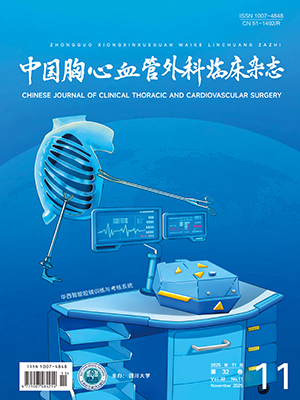| 1. |
Watanabe M, Otake R, Kozuki R, et al. Recent progress in multidisciplinary treatment for patients with esophageal cancer. Surg Today, 2020, 50(1): 12-20.
|
| 2. |
Pauthner M, Haist T, Mann M, et al. Surgical therapy of early carcinoma of the esophagus. Viszeralmedizin, 2015, 31(5): 326-330.
|
| 3. |
Best LM, Mughal M, Gurusamy KS. Non-surgical versus surgical treatment for oesophageal cancer. Cochrane Database Syst Rev, 2016, 3(3): 1-47.
|
| 4. |
Le Page PA, Velu PP, Penman ID, et al. Surgical and endoscopic management of high grade dysplasia and early oesophageal adenocarcinoma. Surgeon, 2016, 14(6): 315-321.
|
| 5. |
Gong L, Yue J, Duan X, et al. Comparison of the therapeutic effects of endoscopic submucosal dissection and minimally invasive esophagectomy for T1 stage esophageal carcinoma. Thorac Cancer, 2019, 10(11): 2161-2167.
|
| 6. |
Li C, Yamashita DT, Hawel JD, et al. Endoscopic mucosal resection versus esophagectomy for intramucosal adenocarcinoma in the setting of Barrett's esophagus. Surg Endosc, 2017, 31(10): 4211-4216.
|
| 7. |
Zhang Y, Ding H, Chen T, et al. Outcomes of endoscopic submucosal dissection vs esophagectomy for T1 esophageal squamous cell carcinoma in a real-world cohort. Clin Gastroenterol Hepatol, 2019, 17(1): 73-81.
|
| 8. |
Wirsching A, Boshier PR, Krishnamoorthi R, et al. Endoscopic therapy and surveillance versus esophagectomy for early esophageal adenocarcinoma: A review of early outcomes and cost analysis. Am J Surg, 2019, 218(1): 164-169.
|
| 9. |
Watanabe M, Suehara N, Koga K, et al. Outcomes of endoscopic submucosal dissection and esophagectomy for early and superficial carcinoma of the esophagus. Esophagus, 2010, 7(4): 215-217.
|
| 10. |
Jin XF, Gai W, Chai TH, et al. Comparison of endoscopic resection and minimally invasive esophagectomy in patients with early esophageal cancer. J Clin Gastroenterol, 2017, 51(3): 223-227.
|
| 11. |
Qin J, Peng Y, Chen W, et al. Comparative study of esophagectomy, endoscopic therapy, and radiotherapy for cT1N0M0 esophageal cancer in elderly patients: A SEER database analysis. Thorac Cancer, 2019, 10(7): 1511-1520.
|
| 12. |
Yuan BS, Liu LL, Huang HR, et al. Comparison of the short-term and long-term outcomes of surgical treatment versus endoscopic treatment for early esophageal squamous cell neoplasia larger than 2 cm: A retrospective study. Surg Endosc, 2019, 33(7): 2304-2312.
|
| 13. |
Yang AJ, Choi SH, Byun HK, et al. Management of clinical T1N0M0 esophageal cancer. Gut Liver, 2019, 13(3): 315-324.
|
| 14. |
Nelson DB, Dhupar R, Katkhuda R, et al. Outcomes after endoscopic mucosal resection or esophagectomy for submucosal esophageal adenocarcinoma. J Thorac Cardiovasc Surg, 2018, 156(1): 406-413.
|
| 15. |
Cummings LC, Kou TD, Schluchter MD, et al. Outcomes after endoscopic versus surgical therapy for early esophageal cancers in an older population. Gastrointest Endosc, 2016, 84(2): 232-240.
|
| 16. |
Min YW, Lee H, Song BG, et al. Comparison of endoscopic submucosal dissection and surgery for superficial esophageal squamous cell carcinoma: A propensity score-matched analysis. Gastrointest Endosc, 2018, 88(4): 624-633.
|
| 17. |
Pech O, Bollschweiler E, Manner H, et al. Comparison between endoscopic and surgical resection of mucosal esophageal adenocarcinoma in Barrett's esophagus at two high-volume centers. Ann Surg, 2011, 254(1): 67-72.
|
| 18. |
Zehetner J, DeMeester SR, Hagen JA, et al. Endoscopic resection and ablation versus esophagectomy for high-grade dysplasia and intramucosal adenocarcinoma. J Thorac Cardiovasc Surg, 2011, 141(1): 39-47.
|
| 19. |
Ballard DD, Choksi N, Lin J, et al. Outcomes of submucosal (T1b) esophageal adenocarcinomas removed by endoscopic mucosal resection. World J Gastrointest Endosc, 2016, 8(20): 763-769.
|
| 20. |
Schmidt HM, Mohiuddin K, Bodnar AM, et al. Multidisciplinary treatment of T1a adenocarcinoma in Barrett's esophagus: Contemporary comparison of endoscopic and surgical treatment in physiologically fit patients. Surg Endosc, 2016, 30(8): 3391-3401.
|
| 21. |
Treitl D, Hurtado M, Ben-David K. Minimally invasive esophagectomy: A new era of surgical resection. J Laparoendosc Adv Surg Tech A, 2016, 26(4): 276-280.
|
| 22. |
Sanghi V, Amin H, Sanaka MR, et al. Resection of early esophageal neoplasms: The pendulum swings from surgical to endoscopic management. World J Gastrointest Endosc, 2019, 11(10): 491-503.
|
| 23. |
Ramay FH, Vareedayah AA, Visrodia K, et al. What constitutes optimal management of T1N0 esophageal adenocarcinoma? Ann Surg Oncol, 2019, 26(3): 714-731.
|
| 24. |
McLaren PJ, Dolan JP. Surgical treatment of high-grade dysplasia and early esophageal cancer. World J Surg, 2017, 41(7): 1712-1718.
|




